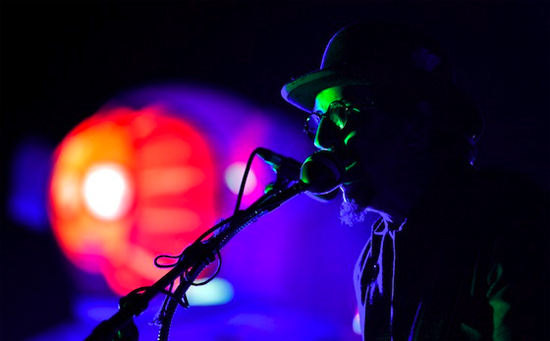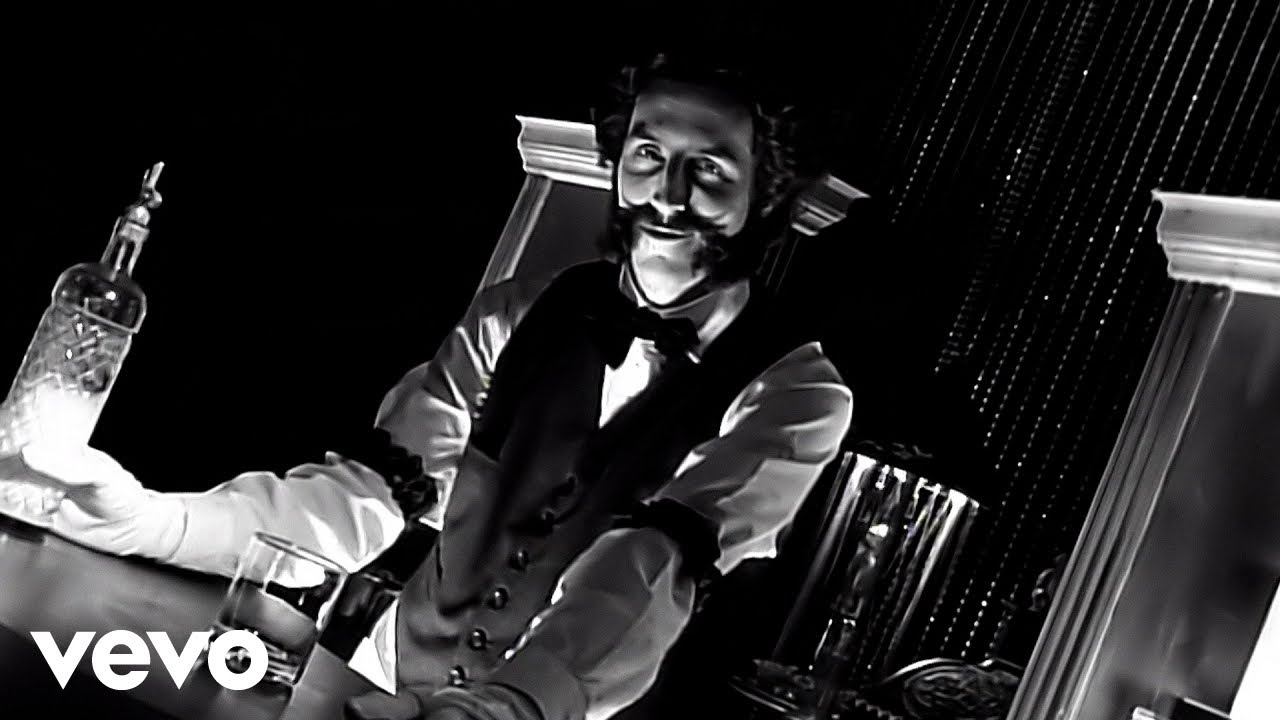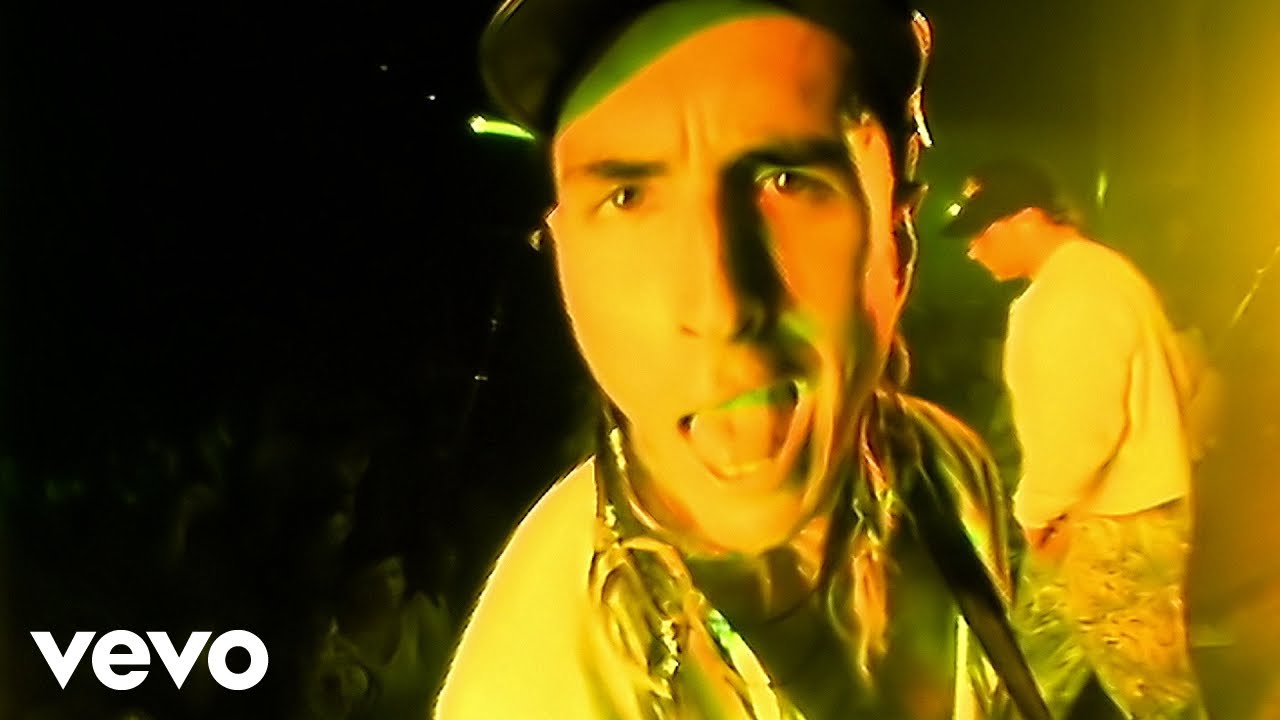While the world was witnessing the rise in MTV video popularity and music listeners were running to pick up the latest album releases such as Bruce Springsteen’s Born In The USA, Bob Marley’s Legend and Talking Heads’ Stop Making Sense, somewhere near a foggy bay outside of San Francisco, three like-minded mutants came together: ex-Blind Illusion bassist Les Claypool, guitarist Todd Huth and drummer Jay Lane. With an appetite for the abstract, Primus began to construct an unconventional sound which would later be celebrated by music fans as one of the most oddly progressive rock bands ever to emerge out of the American music scene of the 1980s and 1990s.
Before settling on the name Primus, the trio had already traded for years as Primate and then Sausage, going through numerous line-up changes in the process. In 1989 Claypool took a brief hiatus to rejoin Blind Illusion where he met Larry LaLonde, the guitarist he would essentially end up poaching. When he reformed Primus it was with LaLonde and Tim Alexander on drums.
With the financial help of Claypool’s father, within less than a year they released their first album, Suck On This, a compilation of live tracks taken from two shows performed in Berkeley, California. It was a collection of songs that not only showed listeners what was to become of the Primus sound, but also was the first time we would hear the classic ‘Tommy The Cat’, which later made its way onto their definitive album, Sailing The Seas of Cheese.
Just what defines the Primus sound remains a mystery until this day. Their music does not blast straight and narrow into the ear; its collusive blend of progressive rock, funk, metal, punk rock and psych is aggressive and left-field, yet fun. If you look deep enough into the heart of it all, you just might find the soul of some hillbilly trapped inside.
Claypool’s musical attack is unique – a kinetic relationship between rhythm and lyricism, crash-landing into a bizarre world of storytelling and character. Although inspired by funk and prog rock bassists like Larry Graham (Sly And The Family Stone), Bootsy Collins, Geddy Lee (Rush) and Chris Squire (Yes), Claypool steeps such styles with adverse humour and tact, evoking an off-beat and sometimes psychedelic fairytale realm for those who are in need of some madness – or, in some sense, escaping their own madness.
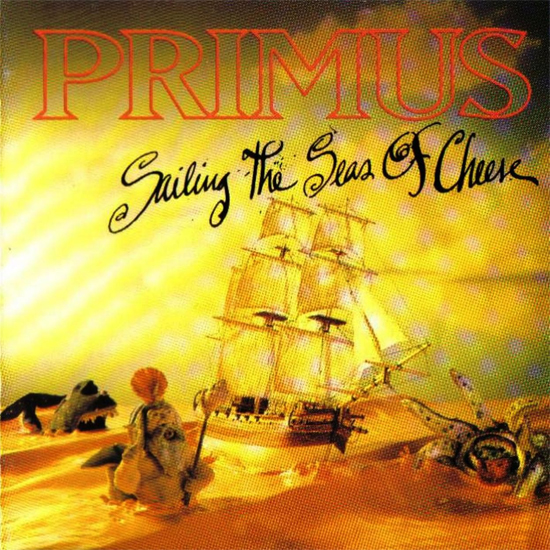
A year after the release of Suck On This, Primus released their first studio album, Frizzle Fry. Miraculously, they landed a hit on the radio with ‘John The Fisherman’, leaving both critics and fans both bobbing and scratching their heads. The following year they released their second studio album, Sailing The Seas Of Cheese, which would not only represent the peak of their sound, but would go gold by the summer of 1993 amidst the Seattle grunge and alternative music explosion.
Although being sold in an alternative market, Primus was an alternative to what was being called ‘alternative’ and in some sense still very much an underground concern, despite their gold discs. Sharing a haphazard nature with funk/punk metal acts like Red Hot Chili Peppers, Suicidal Tendencies, Fishbone and Mr. Bungle in the early 80s – at the time embraced mainly by skateboarders – Primus proved part of that crossover between funk and metal, continuously and carefully reinventing it, bringing it into the 90s and far beyond.
However, when Sailing The Seas of Cheese broke them to a wider audience, Primus introduced their sound to a new ilk of music fan – those unsure exactly where to turn during the onslaught of grunge music and the alternative music market infiltrating the masses. The extent to which Nirvana, Mudhoney, Soundgarden and Pearl Jam were saturating the music scene was beginning to alienate some who were in need of something weirder, something more mysterious. Primus stood out in that respect.
In celebrating twenty years of Sailing The Seas Of Cheese, the trio have gone back to the lab to bring this classic album up to date for die hard and new fans alike, remixed and reassessed. It features a surreal mix of the album brought to you in a 5.1 surround sound ratio available on DVD or Blu-ray, a new stereo mix of the album, psychedelic visuals and some live gems thrown in there from 2012’s 3D Tour. The Quietus caught up with Claypool to discuss the re-release and why, years down the line, Primus remain as enigmatic and tough to pin down as ever.
Seas Of Cheese is your most pivotal album, I think. It certainly has held up. In your opinion, is it the album that defines Primus?
Les Claypool: Primus was always that thing you couldn’t put your finger on. How many times have I seen folks try to categorise Primus, and it’s not possible. People ask me all the time. When I run into folks, whether it’s at a hardware store or an event, and they find out I am a musician and ask what kind of music I play, I say "I have no idea." I don’t know what the hell it is. It’s the reason we have this longevity with our career. When the different trends and what not happen after it peaks, and subsequently there are valleys, we weren’t part of any of that, so we never had those peaks and valleys. We always sort of produced under the radar.
What is it about 5.1 surround sound that excites you and has led to you wanting to put these albums in that format?
LC: Ever since this 5.1 technology has become available, many years ago, I thought it would be an amazing thing to do for this album, and I’d like to do it with every one of my other records too. There was just this talk about the 20th anniversary to do something special with Seas Of Cheese. I’ve always wanted to include visual elements without the music, because there are a lot of storylines and characters and what not, throughout these albums. Seas Of Cheese being one of the most fundamental records for us.
Was mixing in 5.1 a very complex process?
LC: It can be. It can be relatively easy, but for us it was difficult because all the original studio notes were lost, so we had to reconstruct everything again. But we used a bunch of old analogue gear and did our best to recreate this thing. We were also able to tighten things up in frequency – bring up more bottom and clarity on certain things. You know, running through all this old analogue gear, things can breathe a little more now. There are things that I’m hearing now that I never even heard before. When you start separating things, you can really hear a lot more individuality in the sound.
There’s evidently a wide range of influence, style and sound in your music, even in such bands like Frog Brigade and what have you. Is labeling Primus "progressive rock" a bad way to describe the music?
LC: I think our music is more of an inertia. Progressive rock is only a sliver of what we collectively were into. On any given day, we’re listening to anything from Peter Gabriel’s Passion to XTC to Larry Graham, you know? But yeah, there’s a broad range of influence for the Primus sound.
As some bands took issue with it then, did Primus ever identify or mind being in an "alternative" market?
LC: Back then, alternative music was what the dictionary definition of the word was. It was alternative to what was popular at the time. It wasn’t until a lot of our contemporaries became extraordinary popular that alternative became pop music. In the early days it meant what was alternative to what the hell is going on. In the 80s, new wave was a new wave of music which was not what you would necessarily find on the radio. It’s just the nature of things
Did alternative music becoming a pop genre sort of taint the excitement of hearing new music after a while? The airwaves were flooded with one hit wonders, copy cats. A case of "Where do we go from here? How do I find the good shit?" Thom Yorke of Radiohead referred to it as a "refrigerator buzz". Is music getting progressively worse?
LC: I think that perspective is the perspective of an older individual [laughs]. There’s all these things that are incredibly exciting to my daughter and her friends that I am completely clueless about are, as other people, even journalists, depending on who they are talking to. They don’t know necessarily of all these things bubbling under the surface.
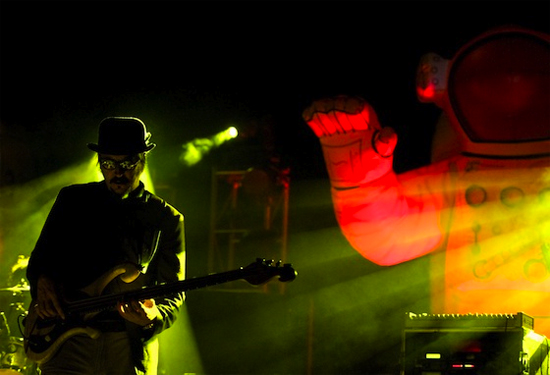
What was bubbling when you were coming up?
LC: When I was coming up there were things like Fishbone and Red Hot Chili Peppers, and then it got to a point where people knew about these bands. They were monumental, they were huge.
You mentioned that putting your finger on the collective sound of Primus is not an easy thing to do. The same can be said solely about your bass playing, versus how the instrument is thought to be approached conventionally.
LC: I got the "pumping and the flucking", as it’s called, from watching guys like Larry Graham, Stanley Clarke, you know? Then someone in the 90s said lets call it "slap bass". For me, the bass happens to be the crayon I picked out of the box. If I picked up the guitar, the banjo, the trumpet, similar sounds would be coming out of me. That’s just what I chose to paint my pictures with – the bass.
Being a diverse musician and a fan of metal, you auditioned for Metallica in the ’80s after the loss of their bassist Cliff Burton. Do you ever wonder what would have happened if you got the job?
LC: Well, I didn’t get the gig for a reason. I wasn’t the right guy. I wasn’t what they were looking for. They were looking for a guy who could play a solely supporting role. Yeah, I could have pulled it off and played the music, but it would have been counter-intuitive to my nature. The …And Justice For All album, the one they did after Cliff’s death, you can’t even hear the bass. It would have been a wonderful thing. I would have had a way bigger bank account [laughs] but I just don’t think it would have worked on many levels. It would have been fun for a little while, I am sure, but that’s not what they were looking for – it’s not what they needed. The guy they got now is amazing. He’s a great guy. It worked out for everyone.
In playing and songwriting, was there a conscious effort for Primus to try and be unique?
LC: To an extent, maybe in the early days, but after a while, you’re just trying to… you know, you’re given a certain amount of Popsicle sticks and try to make something out of them. That’s what we needed for Seas Of Cheese and Pork Soda. Things like that. We utilised things that we had, like myself, Larry and Tim, but you’re not necessarily working with Popsicle sticks…
No.
LC: …you’re bringing in your own Popsicle sticks to build what you want.
Sometimes those Popsicle sticks don’t get taken to immediately. Do you think your music has ever alienated anyone because of its abstract sound and approach?
LC: Well, there’s plenty of people who don’t get it that don’t necessarily want to get it.
What would they be trying to "get"?
LC: Hmmm. Well, you tell me, are you a fan?
Indeed. Frizzle Fry, Seas Of Cheese and Miscellaneous Debris were albums I owned growing up in my twenties. But you either like it or you don’t. I just have heard people say they don’t get your music. Maybe they are just a suspicious lot.
LC: [Laughs] Primus albums, in my opinion, are like Coen brothers films. You have these colorful characters, but there’s a lot of darkness to them, they tend to be tragic. I mean, there’s a lot of dark material off Primus records. ‘Jerry Was A Racecar Driver’ is about a guy who gets drunk, has a run-in with a tree and kills himself. ‘John The Fisherman’, a tragedy. Then there are straight up songs like ‘Bob’, about a friend of mine who hung himself. Like life in general, through adversity there is a lot of humour. That’s how people deal. That’s how I deal. It’s always been done through humour. That’s what my lyrics reflect- stories that I grew up listening to, whether they were musicals or lots of country music. There were a lot of tales being told. That’s what I tend to be drawn towards – something that tells some kind of tale.
Essentially you are a storyteller.
LC: Well, as a vocalist I always had a tough time, because I never thought of myself as a singer. I was sort of rushed into the role, because I didn’t like any of the singers in the bands I was in that couldn’t convey my lyrics,so I took over the role. I always joked that I was the narrator until I got a little more comfortable with my voice and I could actually sing. Early on, it was easier for me to take on a role of one of these characters and be on stage in the character or whoever the hell I am, trying to project and convey these lyrics.
The reissue of Sailing The Seas Of Cheese is out now via Commercial Marketing

